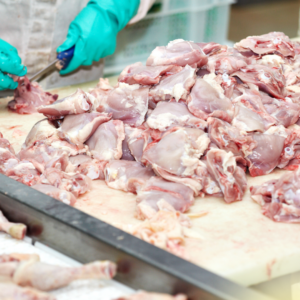Investors Call on Tyson to Protect Workers

On February 6, 2025, Tyson Foods’ investors will vote on a shareholder proposal calling on the Company to disclose voting results according to the class of shares.The proposal (Proposal 4), filed by the American Baptist Home Mission Societies (ABHMS) highlights misalignment between independent shareholders’ material human rights concerns and Tyson’s responsiveness to such material risks. Voting in favor of this proposal is necessary because Tyson’s dual class structure gives the Company’s insider shareholders outsized voting power (about 72%) over all proposals subject to shareholder approval. Voting results on human rights-related shareholder proposals show that Tyson’s insider shareholders significantly skew the voting results, resulting in substantially low percentages of support, even though independent shareholders widely support such proposals.
The Proponent, ABHMS, believes that disaggregating the voting results by class of shares will promote transparency, by allowing shareholders to see how independent shareholders vote on shareholder proposals, and accountability, by publicly signaling to Tyson the importance of addressing material human rights risk.
The Issue: Tyson’s Dual-Class Structure
For years, long-term, faith-based investors have tried to engage Tyson, in good faith, on issues of human rights due diligence, racial equity, and worker health and safety. This group of investors believes all workers in Tyson’s operations and supply chains, including contracted and subcontracted workers, are endowed with inherent dignity and worth and should not be treated as expendable.
 Exploitation of workers and poor labor conditions has been linked to lower productivity, higher turnover, more workplace injuries, and overall decreased financial performance. Protecting workers is especially crucial in the meatpacking sector, which is one of the most dangerous industries in the country, and of which Tyson has the highest number of reported severe injuries, such as amputations. Investors have repeatedly raised human rights concerns with Tyson, but the Company has failed to adequately address these issues. Notably, because of Tyson’s dual class structure, voting results on shareholder proposals often receive very low support, allowing the Company to legitimize its nonresponsiveness to such human rights concerns. However, as will be shown below, there is a huge disparity between the independent and overall percentage support, signaling that the Company’s priorities are not aligned with those of independent shareholders. As of September 2023, insider shareholder Tyson Limited Partnership (TLP) controlled nearly 100% of the outstanding Class B stock, giving it 71.74% of the total voting power of the Company’s outstanding voting stock. Tyson itself recognizes its outsized voting power “to exert substantial influence or actual control over our management and affairs and over substantially all matters requiring action by our stockholders,” that “may also delay or prevent a change in control otherwise favored by our other stockholders…”
Exploitation of workers and poor labor conditions has been linked to lower productivity, higher turnover, more workplace injuries, and overall decreased financial performance. Protecting workers is especially crucial in the meatpacking sector, which is one of the most dangerous industries in the country, and of which Tyson has the highest number of reported severe injuries, such as amputations. Investors have repeatedly raised human rights concerns with Tyson, but the Company has failed to adequately address these issues. Notably, because of Tyson’s dual class structure, voting results on shareholder proposals often receive very low support, allowing the Company to legitimize its nonresponsiveness to such human rights concerns. However, as will be shown below, there is a huge disparity between the independent and overall percentage support, signaling that the Company’s priorities are not aligned with those of independent shareholders. As of September 2023, insider shareholder Tyson Limited Partnership (TLP) controlled nearly 100% of the outstanding Class B stock, giving it 71.74% of the total voting power of the Company’s outstanding voting stock. Tyson itself recognizes its outsized voting power “to exert substantial influence or actual control over our management and affairs and over substantially all matters requiring action by our stockholders,” that “may also delay or prevent a change in control otherwise favored by our other stockholders…”
Studies have shown that companies with dual class structures are more likely to suffer from corporate governance deficiencies, such as a lack of independent board leadership and a gap in board transparency and accountability, and more likely to face environmental and social controversies. These problems can negatively impact the long-term financial performance of the company.
Investors believe disclosing proposal votes by class of shares would allow shareholders to better monitor how responsive Tyson is to issues that a majority of non-insider shareholders raise. Moreover, this disaggregation of voting results is not onerous and would promote transparency and accountability of the Company, encouraging it to respect the dignity and human rights of all workers in its operations and supply chains.
2021 and 2024 Shareholder Proposals

* The dotted line represents 50% support. Once a proposal passes 50%, it “passes,” which, although it is not binding, signals significant shareholder support.
Examples of Tyson’s Nonresponsiveness
Human rights due diligence (2021):
In 2020, ABHMS filed a shareholder proposal, asking Tyson to prepare a report on its human rights due diligence process to assess, identify, prevent, mitigate, and remedy actual and potential human rights impacts. Investors were concerned about Tyson’s mishandling of the COVID-19 pandemic, which led to thousands of worker infections and dozens of deaths. Notably the proposal received 18.4% shareholder support, but when insider shares were excluded, the independent support rose to 78.7%.
Tyson did not adequately address this issue, but instead, opposed the proposal, claiming it “put in place significant protections at all of our facilities that meet or exceed CDC and OSHA guidance for preventing COVID-19.” Two subsequent congressional reports detail Tyson’s failure to protect its workers during the COVID-19 pandemic and active opposition to federal and state health emergency safeguard, which led to thousands of infections, hundreds of deaths, and disparate impacts on workers of color.

Racial equity (2022):
In 2021, ABHMS filed a shareholder proposal, requesting Tyson commission an independent racial equity audit (REA), analyzing if, and how, Tyson’s policies and practices discriminate against or disparately impact communities of color. Investors were concerned about unsafe working conditions, unfair promotion practices, and racial discrimination and harassment in Tyson’s meatpacking plants – conditions that were exacerbated by the COVID-19 pandemic and that predominantly affected Latinx and Black workers.
The proposal was withdrawn when Tyson agreed to commission an independent REA. Despite this public commitment in 2021 to conduct and publish an independent REA, and countless attempts by this faith-based investor group to ensure Tyson honor its commitment, Tyson has still not published any information regarding the REA.
Child labor (2024):
In 2024, ABHMS, filed another shareholder proposal, asking Tyson to commission an independentthird-party audit assessing the effectiveness of the Company’s policies and practices in preventing illegal child labor throughout its value chain. Investors were concerned about emerging reports of illegal child labor being present in meatpacking plants, including the Department of Labor’s (DOL) finding of 7 children illegally working in Tyson’s plants. Notably the proposal received 12.12% shareholder support, but when insider shares were excluded, the independent support rose to 54.5%.
Voted Shares Support for Child Labor Audit Proposal

Tyson did not adequately address this issue. Instead, the Company opposed the shareholder proposal, listing a few measures it took to address illegal child labor, including terminating only the contracts related to the investigation findings and implementing a vague compliance program with random third-party audits. None of these measures sufficiently addressed the systemic issues highlighted in the shareholder proposal.

As a result, Tyson still faces significant risks of illegal child labor being present in its value chain. Since the shareholder proposal was filed, DOL launched a separate investigation into whether Tyson had relied on migrant child labor to clean its slaughterhouses. The investigation is ongoing, but investors are concerned this is just the beginning of an increase in illegal child labor cases coming to light. Moreover, investors are concerned about risks of illegal child labor occurring at Tyson’s contract poultry farms. Most recently, the DOL fined a sanitation company in January 2025 for employing children to clean slaughterhouses, including Tyson’s plant in Virginia. As the new Trump administration’s immigration policies begin to be implemented, Tyson faces increased risk of illegal child labor.
Call to Action
Investors call on Tyson to disclose voting results by class of shares, thereby increasing transparency and accountability, to ultimately uphold the human rights of the Company’s workforce. Specifically, investors make the following calls to action:
To Tyson Foods: Protect workers, especially migrant workers, within your operations and supply chains.
The US meatpacking industry, of which Tyson Foods is the largest, relies heavily on migrant workers. During a time of increasing uncertainty and fear for migrant workers, stoked by the Trump administration’s xenophobic threats and large-scale raids and deportations, Tyson has a moral imperative and a financial obligation to protect its workers.
As a Company committed to valuing the entire wellbeing of its workers, and having “one of the largest private sector corporate chaplaincy programs in the country,” Tyson has a moral imperative to take care of its workers, especially its migrant workforce who are most vulnerable. Faith-based investors believe all workers, including immigrants, are endowed with inherent dignity and worth, and as a vulnerable population, they should be protected by Tyson. Echoing the words of the Bible, faith-based investors affirm the inherent dignity of all immigrants: “The foreigner residing among you must be treated as your native-born. Love them as yourself, for you were foreigners in Egypt” (Leviticus 19:34) (NIV).
Additionally, Tyson should protect its migrant workforce because it is financially beneficial and can help the Company prevent and mitigate material risks. As a meatpacking company operating in an environment where a majority of the workforce is comprised of migrant workers, Tyson stands to lose a significant portion of its workforce. This can further exacerbate the longstanding labor shortage challenge in the meatpacking industry, which has also been correlated with an increase in illegal child labor.
It is time for Tyson to put its words into action by proactively protecting workers in its operations and supply chains.
To Tyson Shareholders: Vote FOR proposal 4, requesting Tyson publish voting results by class of shares. Demand that Tyson honor its commitment to producing a racial equity audit and that it protect its large migrant workforce.
– Investor Advocates for Social Justice
For press inquiries or additional questions, please reach out to Aaron Acosta, Program Director, at aacosta@iasj.org

